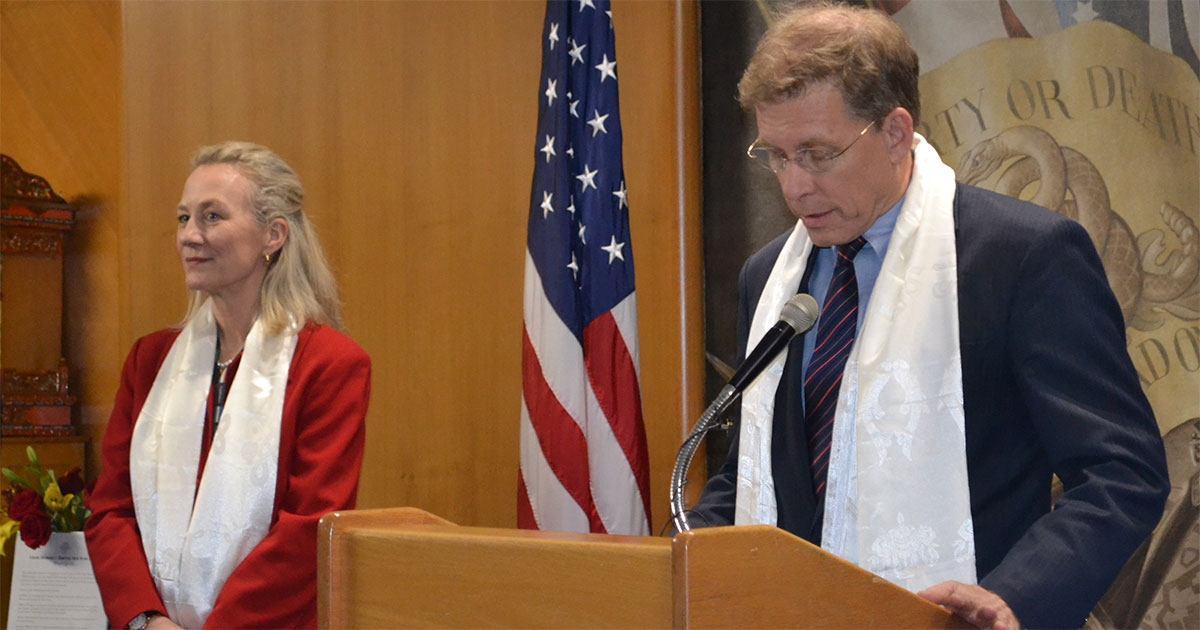
Alice G. Wells and W. Patrick Murphy of the State Department addressed the crowd at the Losar Tibetan New Year reception in Washington, DC on Feb. 8, 2019.
The recent and future successes of the Tibetan-American community were celebrated at a Tibetan New Year event at the State Department last week that sent strong messages about continued US support for Tibet.
The State Department’s Office of the Special Coordinator for Tibetan Issues organized the gathering on Feb. 8, 2019 for Losar, the start of the Tibetan Year of the Earth Pig.
The event, which attracted dozens of US government officials, diplomats, civil society representatives, and Tibetan Americans, featured traditional Tibetan music and dance performances, Tibetan food and remarks by US and Tibetan leaders.
“We’re also celebrating, in addition to cuisines and traditions, contributions from our Tibetan-American community and Tibetans around the world to spiritual and educational life, including here in the US,” said W. Patrick Murphy, principal deputy assistant secretary in the department’s Bureau of East Asian and Pacific Affairs. “We all benefit from these contributions.”
Progress made
Though the event was largely festive, speakers noted the immense challenges facing Tibet, a historically independent country that China continues to rule with an iron fist.
“Under Chinese occupation, my fellow Tibetans have faced genocide, religious persecution, marginalization, human rights violations, and, now, we are facing what is called ‘ecocide,’” the destruction of Tibet’s environment by China’s reckless development projects, said Tsetan Choedon, Board member of the Capital Area Tibetan Association.
Speakers noted that progress has been made recently in advancing the Tibetan cause in the United States.
Particular praise was heaped on the Reciprocal Access to Tibet Act, which was signed into law in December 2018.
The legislation, which received bipartisan support in Congress, calls for access to Tibet for Americans and requires the State Department to revoke or deny US visas for Chinese officials who are responsible for keeping US diplomats, journalists and ordinary citizens out of Tibet.
“That’s a direct slap on the CCP, on the Chinese Communist Party, of the [policy] violating and not giving free access to Tibet,” said Ngodup Tsering, Representative of His Holiness the Dalai Lama to North America.
Tsering also spoke with joy about the Asia Reassurance Initiative Act of 2018, USAID support for Tibetans and calls by the State Department for the release of the Panchen Lama, a revered figure in Tibetan Buddhism, who was abducted by Chinese authorities in 1995 at age six and has not been seen in public since.
Tremendous friends
The variety of people at the Losar event showed “a tremendous range of friends committed to supporting the Tibetan people, including here today represented NGOs, universities, diplomats and our friends from the US Congress,” Murphy said.
The International Campaign for Tibet (ICT) supported the organization of the event.
Alice G. Wells, principal deputy assistant secretary in the Bureau of South and Central Asian Affairs, talked about how Losar takes stock of the achievement of the past year and looks for opportunities ahead. She said she looked forward to expanding engagement and cooperation between the US Embassy in New Delhi and Office of His Holiness the Dalai Lama and the Central Tibetan Administration in India. Wells also hailed Richard Gere, “whose activism across South Asia has done so much to increase awareness of the challenges facing the Himalayan people.” Gere is the Chairman of the Board of ICT.
The event also affirmed that US support for Tibetans will remain strong in the Tibetan new year and beyond.
“We recognize the Tibetan people must have a voice in their own future, and it’s for this reason that we are fully committed to dialogue between the People’s Republic of China and His Holiness the Dalai Lama’s representatives to reach a negotiated settlement on Tibet,” Murphy said. “This can and should include meaningful autonomy” for Tibetans.
Pamela Pryor, Senior Advisor in the State Department, moderated the event.

